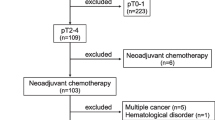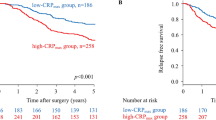Abstract
Background
Surgical resection is the mainstay of treatment for patients with gastric cancer (GC). Development of a simple, high-performance, integrated scoring system is needed to provide appropriate management. This study aimed to evaluate predictive values of the systemic inflammation score (SIS) for short- and long-term outcomes of patients who underwent surgery for GC.
Methods
A total of 187 patients who underwent gastrectomy for pT2–4 GC without preoperative treatment were analyzed. SIS was formulated based on serum albumin level and lymphocyte–monocyte ratio, and graded into SIS 0, 1, and 2.
Results
Preoperative SIS was significantly associated with incidence of postoperative complications, showing a stepwise increased incidence in proportion to SIS in the entire cohort and all subgroups according to operative procedure and disease stage. Overall and disease-free survival times of patients in SIS 0, 1, and 2 shortened in a stepwise fashion. SIS was linked to prevalence of hematogenous metastasis as initial recurrence site. Survival differences between patients with SIS 2 and the others were particularly large in patients who underwent adjuvant chemotherapy. The continuation rate of adjuvant S-1 was lower in the SIS 2 group.
Conclusion
SIS represents a simple predictor for incidence of postoperative complications and survival in patients with pT2–4 GC.




Similar content being viewed by others
References
Van Cutsem E, Sagaert X, Topal B et al (2016) Gastric cancer. Lancet 388:2654–2664
Kanda M, Mizuno A, Fujii T et al (2016) Tumor infiltrative pattern predicts sites of recurrence after curative gastrectomy for stages 2 and 3 gastric cancer. Ann Surg Oncol 23:1934–1940
Shen L, Shan YS, Hu HM et al (2013) Management of gastric cancer in Asia: resource-stratified guidelines. Lancet Oncol 14:e535–e547
Kurita N, Miyata H, Gotoh M et al (2015) Risk model for distal gastrectomy when treating gastric cancer on the basis of data from 33,917 Japanese patients collected using a nationwide web-based data entry system. Ann Surg 262:295–303
Kanda M, Tanaka C, Kobayashi D et al (2017) Proposal of the coagulation score as a predictor for short-term and long-term outcomes of patients with resectable gastric cancer. Ann Surg Oncol 24:502–509
Mantovani A, Allavena P, Sica A et al (2008) Cancer-related inflammation. Nature 454:436–444
Huang L, Liu S, Lei Y et al (2016) Systemic immune-inflammation index, thymidine phosphorylase and survival of localized gastric cancer patients after curative resection. Oncotarget 7:44185–44193
Suzuki Y, Okabayashi K, Hasegawa H et al (2018) Comparison of preoperative inflammation-based prognostic scores in patients with colorectal cancer. Ann Surg 267:527–531
Chan JC, Chan DL, Diakos CI et al (2017) The lymphocyte-to-monocyte ratio is a superior predictor of overall survival in comparison to established biomarkers of resectable colorectal cancer. Ann Surg 265:539–546
Chang Y, An H, Xu L et al (2015) Systemic inflammation score predicts postoperative prognosis of patients with clear-cell renal cell carcinoma. Br J Cancer 113:626–633
Sobin LH, Gospodarowicz MK, Wittekind C (2009) International Union Against Cancer, TNM classification of malignant tumors, 7th edn. Wiley-Blackwell, New York
Japanese Gastric Cancer Association (2017) Japanese gastric cancer treatment guidelines 2014 (ver. 4). Gastric Cancer 20:1–19
Clavien PA, Barkun J, de Oliveira ML et al (2009) The Clavien–Dindo classification of surgical complications: five-year experience. Ann Surg 250:187–196
Kanda M, Murotani K, Kobayashi D et al (2015) Postoperative adjuvant chemotherapy with S-1 alters recurrence patterns and prognostic factors among patients with stage II/III gastric cancer: a propensity score matching analysis. Surgery 158:1573–1580
Sasako M, Sakuramoto S, Katai H et al (2011) Five-year outcomes of a randomized phase III trial comparing adjuvant chemotherapy with S-1 versus surgery alone in stage II or III gastric cancer. J Clin Oncol 29:4387–4393
Kanda M, Kobayashi D, Tanaka C et al (2016) Adverse prognostic impact of perioperative allogeneic transfusion on patients with stage II/III gastric cancer. Gastric Cancer 19:255–263
Kanda M, Shimizu D, Tanaka H et al (2018) Significance of SYT8 for the detection, prediction, and treatment of peritoneal metastasis from gastric cancer. Ann Surg 267:495–503
Geng Y, Shao Y, Zhu D et al (2016) Systemic immune-inflammation index predicts prognosis of patients with esophageal squamous cell carcinoma: a propensity score-matched analysis. Sci Rep 6:39482
Moyes LH, Leitch EF, McKee RF et al (2009) Preoperative systemic inflammation predicts postoperative infectious complications in patients undergoing curative resection for colorectal cancer. Br J Cancer 100:1236–1239
Kim EY, Lee JW, Yoo HM et al (2015) The platelet-to-lymphocyte ratio versus neutrophil-to-lymphocyte ratio: which is better as a prognostic factor in gastric cancer? Ann Surg Oncol 22:4363–4370
Neal CP, Mann CD, Garcea G et al (2011) Preoperative systemic inflammation and infectious complications after resection of colorectal liver metastases. Arch Surg 146:471–478
Pang W, Lou N, Jin C et al (2016) Combination of preoperative platelet/lymphocyte and neutrophil/lymphocyte rates and tumor-related factors to predict lymph node metastasis in patients with gastric cancer. Eur J Gastroenterol Hepatol 28:493–502
Kanda M, Mizuno A, Tanaka C et al (2016) Nutritional predictors for postoperative short-term and long-term outcomes of patients with gastric cancer. Medicine (Baltimore) 95:e3781
Inaoka K, Kanda M, Uda H et al (2017) Clinical utility of the platelet-lymphocyte ratio as a predictor of postoperative complications after radical gastrectomy for clinical T2–4 gastric cancer. World J Gastroenterol 23:2519–2526
Felekis D, Eleftheriadou A, Papadakos G et al (2010) Effect of perioperative immuno-enhanced enteral nutrition on inflammatory response, nutritional status, and outcomes in head and neck cancer patients undergoing major surgery. Nutr Cancer 62:1105–1112
Gonzalez-Torres C, Gonzalez-Martinez H, Miliar A et al (2013) Effect of malnutrition on the expression of cytokines involved in Th1 cell differentiation. Nutrients 5:579–593
Brenner D, Blaser H, Mak TW (2015) Regulation of tumour necrosis factor signalling: live or let die. Nat Rev Immunol 15:362–374
Kanda M, Fujii T, Kodera Y et al (2011) Nutritional predictors of postoperative outcome in pancreatic cancer. Br J Surg 98:268–274
Forssell J, Oberg A, Henriksson ML et al (2007) High macrophage infiltration along the tumor front correlates with improved survival in colon cancer. Clin Cancer Res 13:1472–1479
Pollard JW (2009) Trophic macrophages in development and disease. Nat Rev Immunol 9:259–270
Wang D, Dubois RN (2010) Eicosanoids and cancer. Nat Rev Cancer 10:181–193
Tokunaga M, Tanizawa Y, Bando E et al (2013) Poor survival rate in patients with postoperative intra-abdominal infectious complications following curative gastrectomy for gastric cancer. Ann Surg Oncol 20:1575–1583
Sultan J, Griffin SM, Di Franco F et al (2012) Randomized clinical trial of omega-3 fatty acid-supplemented enteral nutrition versus standard enteral nutrition in patients undergoing oesophagogastric cancer surgery. Br J Surg 99:346–355
Zhao H, Zhao H, Wang Y et al (2013) Randomized clinical trial of arginine-demented enteral nutrition versus standard enteral nutrition in patients undergoing gastric cancer surgery. J Cancer Res Clin Oncol 139:1465–1470
Wang F, Hou MX, Wu XL et al (2015) Impact of enteral nutrition on postoperative immune function and nutritional status. Genet Mol Res 14:6065–6072
Author information
Authors and Affiliations
Corresponding author
Ethics declarations
Conflict of interest
The authors do not have any commercial interest or sources of financial or material support to report.
Electronic supplementary material
Below is the link to the electronic supplementary material.
Rights and permissions
About this article
Cite this article
Sato, B., Kanda, M., Tanaka, C. et al. Significance of Preoperative Systemic Inflammation Score in Short-Term and Long-Term Outcomes of Patients with Pathological T2–4 Gastric Cancer After Radical Gastrectomy. World J Surg 42, 3277–3285 (2018). https://doi.org/10.1007/s00268-018-4597-7
Published:
Issue Date:
DOI: https://doi.org/10.1007/s00268-018-4597-7




